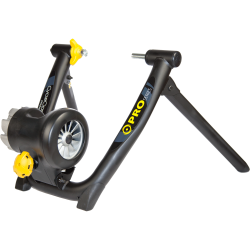Niner MCR Full Suspension Gravel Road Bike Review
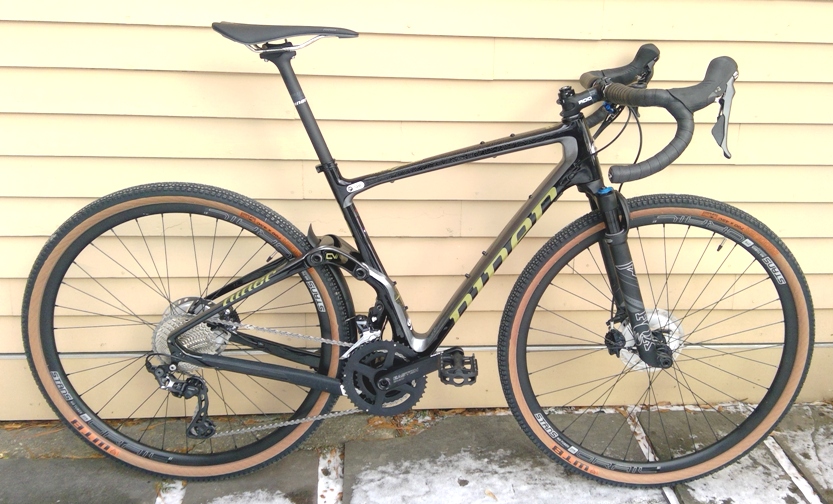 In the beginning, there was the cyclocross bike. Born in racing, but more often ridden in recreation, the cyclocross bike’s wide tires opened up roads previously unexplored by narrow high pressure tires. As time passed, the cyclocross bike evolved to adapt better to the gravel road riding thrust upon it. Wheel bases lengthened, head angles slackened, bottom brackets dropped, top tubes shortened and head tubes grew. Disc brakes replaced cantilevers and tire width increased and fender, rack and accessory accommodations sprouted. Versatility and adaptability created a beast that looks similar to that cyclocross bike of yesteryear, but that is clearly a new species. The “Gravel Bike”, and its many sub-genres (“Adventure”, “Bikepacking”, “Gravel Race”…) became the dominant species in the land of road based bicycles.
In the beginning, there was the cyclocross bike. Born in racing, but more often ridden in recreation, the cyclocross bike’s wide tires opened up roads previously unexplored by narrow high pressure tires. As time passed, the cyclocross bike evolved to adapt better to the gravel road riding thrust upon it. Wheel bases lengthened, head angles slackened, bottom brackets dropped, top tubes shortened and head tubes grew. Disc brakes replaced cantilevers and tire width increased and fender, rack and accessory accommodations sprouted. Versatility and adaptability created a beast that looks similar to that cyclocross bike of yesteryear, but that is clearly a new species. The “Gravel Bike”, and its many sub-genres (“Adventure”, “Bikepacking”, “Gravel Race”…) became the dominant species in the land of road based bicycles.
Evolution never stops; sometimes with unexpected results. This being said, in many ways, the Niner MCR full suspension gravel bike is exactly what you might expect when a company known best for full suspension mountain bikes decides that they want to expand their gravel road bike options. Proven Constantly Varying Arc (CVA) suspension meets bumpy roads. What is the result?
Why Full Suspension on Gravel Roads?
Why full suspension on gravel roads? Simply because some dirt roads and paths/trails are really bumpy, especially in washed out braking and acceleration zones. Even with wide tires running low pressure, bouncing and impact happens; jarring the rider and making the bike feel less controlled.
More consistent tire contact from suspension equals better traction. Better traction allows for smoother and lighter tires that have lower rolling resistance without a traction penalty.
Comfort, control and traction are the biggest reasons why the full suspension Niner MCR can make sense for a number of riders on gravel roads.
What Does “MCR” Mean?
The “MCR” in the Niner MCR name = “Magic Carpet Ride”. In some ways, we could leave this review at this. The Niner MCR gravel bike is designed with a primary purpose – smooth out rough roads like nothing else. Spoiler alert, it does this very well.
Niner CVA Suspension
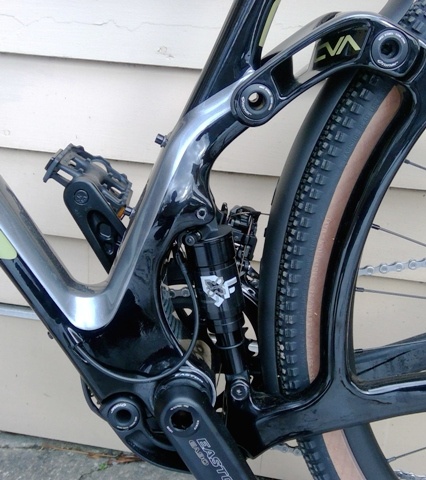 The Niner MCR uses a short travel (50mm rear) “road tuned” version of Niner’s very proven CVA suspension design. CVA is an acronym for Constantly Varying Arc. It is a four bar system with two links. CVA was specifically designed to work well with bigger wheels from day one; it has great transferability from 29” mountain bikes to 700c wheel equipped road bikes.
The Niner MCR uses a short travel (50mm rear) “road tuned” version of Niner’s very proven CVA suspension design. CVA is an acronym for Constantly Varying Arc. It is a four bar system with two links. CVA was specifically designed to work well with bigger wheels from day one; it has great transferability from 29” mountain bikes to 700c wheel equipped road bikes.
Unlike some systems, CVA reacts to chain force instead of shock compression settings to resist squatting under load/acceleration. The system works across a wide range of gearing and chainrings, which is another limitation of a number of other systems which have to be designed and set-up around specific gearing to work properly.
CVA is designed to remain active when climbing (climbing can be bumpy and have low traction too), but, because it reacts to chain load, it has minimal bob. For smooth roads, Niner also includes a thumb activated lockout.
Niner tuned the shock for the needs of road/gravel riding. Compared to mountain bike suspension, this means quicker rebound and a stroke that is tuned to react and support the rider in the higher frequency and lower amplitude hits that gravel road riding tends to produce compared to trail riding.
Up front, the factory equipped MCR bikes come from Niner with a Fox Float 32 AX Gravel fork with 40mm of travel. This is a nice riding fork. However, Niner also offers the MCR as a frame. On higher end builds, we are tempted to pair the frameset up with a lighter fork (like the Lauf) to take some weight off the entire package.
Why Should I Care About Vibration?
In my opinion, the full extent of how damaging vibration is to the human body when riding a bike has not been adequately explored. Well, if it has been adequately explored, it hasn’t been adequately published on the web! What is known is that vibration does a lot of damage. We likely don’t recognize how much vibration we are absorbing and how much energy is consumed by vibration. When it comes to energy conservation, keeping yourself isolated from vibrations can have significant benefit.
For this reason, the Niner MCR is tuned for the high frequency bumps most often found on rough gravel roads. It will be interesting to see how much the MCR design can assist in performance on longer rough rides and with recovery. We’d hedge that there will be a real benefit in both these departments.
Niner MCR Power Transfer
While it is January in Vermont, and this limits our testing, we can tell you that the Niner MCR rides and reacts much like a short-travel Niner mountain bike with CVA suspension. This is a good thing as Niner mountain bikes tend to be very good climbers and confident descenders. There is a very small amount of active motion (bob) in some situations. This being said, it feels like it is active in the right situations when climbing. The bike just follows the terrain and the suspension gets tauter the harder you are pushing on the pedals. This is what most of us want.
The lockout is nice on the pavement and the fact that the performance of Niner’s CVA system is not altered based on gearing choices is crucial to it working well on the (dirt) road.
Niner MCR Weight
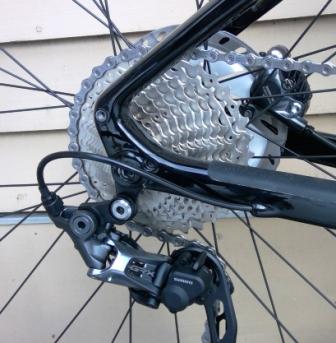 For some riders, the weight of the Niner MCR will potentially be its biggest consideration. The MCR frame and fork simply weigh a fair amount more than a frameset without suspension. The MCR pictured has Niner’s 4 Star build package, which is a 2x Shimano GRX800 based build with alloy rim equipped Stan’s wheels. Putting it on the scale shows 25.5 lbs and it still needs pedals before going outside.
For some riders, the weight of the Niner MCR will potentially be its biggest consideration. The MCR frame and fork simply weigh a fair amount more than a frameset without suspension. The MCR pictured has Niner’s 4 Star build package, which is a 2x Shimano GRX800 based build with alloy rim equipped Stan’s wheels. Putting it on the scale shows 25.5 lbs and it still needs pedals before going outside.
Some people are going to shudder at this weight on a $5900 road bike. We understand this. However, with a bit of effort, a Niner MCR built from a frame and with a pair of light gravel wheels and a Lauf fork would take some notable weight out of the equation. This being said, there is no getting around that the MCR is going to still be 15-20% heavier than some of the lighter gravel bikes on the market.
The bigger question is, “Does the extra weight matter?” If you ride rough and varied terrain, we say, “No. Not much.” Independent assessments have shown that, all else being equal, the MCR’s speed is a virtual dead-heat with a lightweight gravel race bike on mixed terrain. And, the rougher it gets, the more the MCR’s suspension will offer a bigger speed benefit than the small weight penalty.
If you ride smoother terrain regularly and are looking to get to the top of Lincoln Gap or Appalachian Gap as quickly as possible, the MCR is likely not your bike. This being said, if this is your goal, the MCR is likely not even in the right category of bike for your intent…
Handling, Stability and Descending
While we admittedly have only a little real world experience, our preliminary impression is that the Niner MCR is an excellent bike for riders who lack confidence on bumpy and faster descents. Being a fairly long wheelbase bike that is designed for gravel from a geometry perspective helps. Having active suspension keeping the bike consistent and smooth makes the MCR a hard bike to make nervous. This is great for less confident and/or aging riders who are becoming more concerned about their descending speed.
Niner MCR Climbing
A bit like climbing on a full suspension mountain bike, the Niner MCR rewards seated climbing when it is left open and active. Just settle in and pedal consistently and smoothly and let the CVA suspension do its thing. Standing is okay, but the inconsistency of drivetrain force throughout the pedal circle creates minor squat.
As mentioned previously, the Niner MCR includes a thumb activated lockout for the rear shock. The Fox Float AX has a compression dial adjuster that you can quickly lockout the fork as well. If you get on fast and smooth pavement, you’ll likely want to use these features.
Frame Geometry and Fit of the Niner MCR
The frame geometry of the Niner MCR tilts a bit towards the long and low side of the gravel bike fit spectrum. We fear that this may prove a bit of a regret on Niner’s part. While we might be wrong (gravel event racers may flock to the MCR once the benefits are understood), we expect that many early adopters of suspension on the gravel will be people with chronic comfort and/or control issues that are looking for a solution. In general, these riders fit best on a geometry with less reach and more stack than what Niner used on the MCR.
This being said, the Niner MCR geometry is not without virtue. The geometry is thankfully not so extreme that it does not fit any of the people that we think will find it most intriguing reasonably well.
Our suggestion is to get fit first and then use the results to figure out if the Niner MCR fits you well or not.
Niner MCR Spec Options and Price
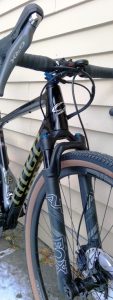 From the factory, Niner offers the MCR at four different build levels with a variety of options. The factory components range from Shimano GRX400 2x and SRAM Rival 22 to Shimano GRX 800 and SRAM Force AXS. Thankfully, Niner also considerately offers a frame only option so that we can build almost anything.
From the factory, Niner offers the MCR at four different build levels with a variety of options. The factory components range from Shimano GRX400 2x and SRAM Rival 22 to Shimano GRX 800 and SRAM Force AXS. Thankfully, Niner also considerately offers a frame only option so that we can build almost anything.
Complete bike prices currently range from $4700 (2 Star GRX 400 build) to $8200 (5 Star Force AXS build) with multiple stops in-between. Frames run $3000.
At Fit Werx, we consider bikes that come out of the box as starting points. We always will work with you to tailor out the bike to fit you properly and also have the best gearing options we can put on it for your needs. Contact us if you want to talk about options and get a final estimate on a Niner MCR set-up specifically for you.
Who Should Look Elsewhere?
Do you want your bike light? While we can likely get a Niner MCR into the lower 20s (pounds), the MCR is never going to be a light bike in its category.
Do you want your bike as simple as possible? The Niner MCR has a true suspension system. Like all suspension systems, it needs periodic maintenance.
Do you want a traditional aesthetic to your bike? You are going to attract some eyes riding a MCR.
Who is the MCR for?
Do you want to expand your horizons by growing your comfort zone, the MCR is for you. You will feel more confident at speed and on rough terrain.
If your back, neck, etc. is bothered by impact, look at your bike fit and how it relates to the MCR’s geometry first, but the MCR could be for you if it fits well.
The 3-4 season commuter looking to be able to ride rough roads confidently and safely.
The rider looking for something different and who isn’t afraid to set the pace on new technology concepts.
Niner MCR Tire Capacity and Use. Gravel Road Bike or Drop bar MTB?
The Niner MCR will accept a healthy 50mm wide tire front and rear. Remember, geometrically and from a handling perspective, the Niner MCR is a wide tire capable drop-bar gravel road bike. It is not designed as a drop-bar equipped mountain bike. Unless you want to end up on your head with some regularity, don’t try to turn it into something it is not by diving into very technical single track.
Niner MCR Conclusions
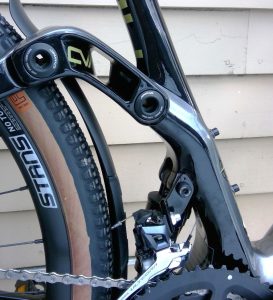 We applaud Niner for taking a big chance with the MCR. It isn’t easy to be first. You are going to be the target of a litany from folks who will insist that they’ve never needed suspension on a road based bike before, so why now? You will get criticized for your aesthetics and the extra weight. It takes guts to throw caution against this and say, “We know that we’ve got something special here that is of value.”
We applaud Niner for taking a big chance with the MCR. It isn’t easy to be first. You are going to be the target of a litany from folks who will insist that they’ve never needed suspension on a road based bike before, so why now? You will get criticized for your aesthetics and the extra weight. It takes guts to throw caution against this and say, “We know that we’ve got something special here that is of value.”
The folks who say that the bike is just a cross country MTB with drop bars and that road bikes don’t need suspension, will also likely have their doubts about the necessity of derailleurs, electronic shifting and wider tires. While I’m unsure that full suspension will take over the gravel road bike world the way it has performance oriented mountain bikes, we clearly see a place for the Niner MCR. So do others…
We hope that the MCR inspires other suspension bikes to enter the gravel fray – a wide tire capable beam bike with damping would be light, aero and super smooth… While we hope that gen 2 of the MCR will be a bit lighter and have a broader fit window, we thank you today Niner for building the MCR and getting the proverbial ball rolling with a design that does what it claims and will help some people rider better and ride longer.
Contact a Fit Werx location for more information; to see how well your fit data matches a MCR; or to schedule a fitting.

